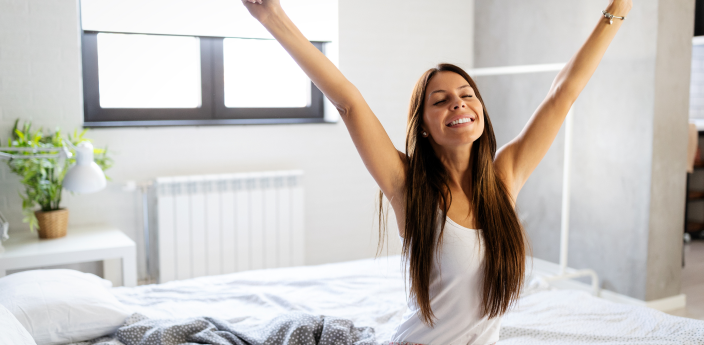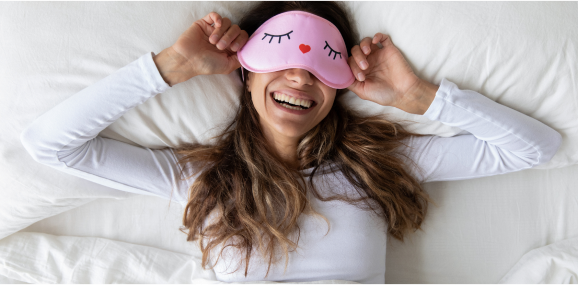For some people, waking up in the morning feels a lot like boarding the struggle bus. Even after eight hours of sleep, the snooze button still takes a beating.
Waking up feels way harder than it should be.
Well, if that’s the way you feel you certainly aren’t alone. Sadly, groggy mornings of waking up on the wrong side of bed is part of the normal routine for many people. The amount of sleep they get doesn’t seem to matter.
There are numerous reasons you could be having difficulty waking up, much of which boils down not only to the quantity of sleep you’re getting but also the quality of sleep.
Thankfully, there are some tips to help you wake up in the mornings feeling refreshed.
When Waking Up Is Hard To Do
There are numerous reasons why waking up in the morning can be difficult. Sometimes it has to do with sleep quantity, sometimes it has other causes that don't have to do with the actual time spent in bed.
It could have something to do with lifestyle factors, underlying conditions, stress and anxiety, poor sleep hygiene, and more. But, at the end of the day all signs likely point to some sort of disruption in the sleep cycle.
The Science of Sleep
Although it seems like a rather simple process to us, sleep is actually pretty complex — a whole lot of stuff is going on in our bodies even after we doze off. Even with all the complexity, one thing is plainly clear: Sleep is crucial for good health.
In fact, without quality sleep we increase our risks for serious health disorders, cardiovascular disease being among them. Good, high quality sleep starts with a clock.
The human body is equipped with internal biological clocks to help carry out our necessary biological functions, this clock is known as our circadian rhythm. In effect, these circadian rhythms refer to the changes our body undergoes within a 24-hour cycle, whether it be biological, physical, or behavioral changes.
The Sleep-Wake Cycle
One of the most important biological functions that circadian rhythms regulate is the sleep-wake cycle. The sleep-wake cycle takes its cues from environmental factors, namely, daylight. It is in-tune and in-sync with the 24-hour night and day cycle.
Our bodies are equipped with a circadian pacemaker known as the suprachiasmatic nucleus (SCN), which is located in the hypothalamus of the brain. It is this set of nerve cells that help regulate the sleep-wake cycle.
Effects of light on the sleep-wake cycle
When exposed to light through retinal detection, the SCN sends signals to cease melatonin production, which is an essential sleep hormone. The result is wakefulness.
At night, this process is reversed as daylight fades. In the evening, the SCN signals the pineal gland to restart melatonin production, which is why we become sleepy in the evenings.
The four stages of sleep
During normal sleep, the body progresses through four stages — this is known as the sleep cycle. On a normal night, the average person will progress through these four stages roughly four to six times.
During these cycles, we experience two types of sleep: Non-rapid eye movement (NREM) and rapid eye movement (REM).
Let’s take a brief look at the four stages of the sleep cycle:
- Stage 1: During the first stage of the sleep cycle certain biological processes in the body begin to slow; this includes heart rate, breathing, eye movement, muscle tension, and brain activity. This signals the transition from wakefulness to sleep. The first stage involves NREM sleep.
- Stage 2: The second stage is also NREM sleep. Out of the four stages, this stage is generally the longest stage. Biological functions are still slowing down, eye movement is nearly still, and core body temperature drops slightly.
- Stage 3: Known as slow-wave sleep or deep sleep, the third stage of NREM is marked by the body’s processes being at their lowest levels. Eye movement ceases. Experts believe the most restorative sleep occurs during stage three of the sleep cycle.
- Stage 4: The final stage of sleep usually occurs about 90 minutes after falling asleep. The biological functions will rise slightly, including heart rate, breathing, etc. Also, eye movement starts to increase. It is during this REM stage that dreaming and memory consolidation occurs.
Reasons You Don’t Feel Refreshed in the Morning
When you have difficulties waking up in the morning and don’t feel at all refreshed, it is typically because of some disruption in the sleep cycle during the night. The reasons for this can vary — some might be self-inflicted (poor habits) while others might have outside factors.
Here are some common reasons you might not be waking up refreshed:
- Not getting enough sleep – The most obvious explanation for having difficulty waking up is sleep quantity. It is recommended that adults get 7 to 9 hours of quality sleep per night.
- Staying in bed too long – Smashing the snooze button might feel good, but getting those extra 10 minutes might do more harm than good. It causes fragmented sleep, which could be why you’re not waking up refreshed.
- Poor bedroom environment – Sleeping in a bedroom that is too hot, too loud, and too well-lit will not help you sleep — it has the opposite effect.
- Something you ate (or drank) – Large meals before bed can cause digestive issues later in the night, which could keep you up. Also, chugging a cup of coffee before lights out isn’t the best idea — try to cut caffeine out of your evening routine.
- Stress – Feelings of anxiety and stress can keep you tossing and turning at night, even if you don’t realize it. The result could be a groggy morning.
If feelings of anxiety and stress are what’s keeping you up at bedtime, then it may be time to give the Sleep Pod a try. Using the principles behind Deep Touch Pressure Stimulation, the Sleep Pod helps promote relaxation at bedtime by reducing feelings of restlessness and bringing you some calm.
The cocoon-like shape and ultra-breathable material offers gentle, calming pressure for a cool, relaxing night’s sleep. So, it’s time to say goodnight to anxiety and hello to a refreshing morning.
7 Tips For Avoiding the Morning Struggle Bus
Waking up in the morning doesn’t have to be a struggle, but it might take a little prep work the night (and day) before. Here are seven tips to help make your mornings feel more refreshing.
1. Don’t Neglect the Light
One of the best things you can do when you’re feeling blah in the morning is let the light in — literally. Crack open those blinds and let the sunshine pour in. As stated, light helps shut down melatonin production, promoting wakefulness and alertness.
Also, don’t neglect sunlight during the day as it helps keep that circadian rhythm going. Cloudy or foggy morning? That’s okay, artificial lights can help do the trick as well.
2. Exercise During the Day
Exercise can do wonders for our overall mood. That is due to its ability to release endorphins (feel-good hormones). Exercise helps increase daytime energy, and daily exercise improves sleep as well.
If you want to see a difference in your sleep (and thus your waking), aim for at least 30 minutes of moderate aerobic exercise per day, no less than three hours before bed.
3. Get Up and Make the Bed
Sometimes the hardest part of getting out of bed is… getting out of bed. Lying there in bed and crushing your alarm clock over and over again will not make things easier. Instead, get out of bed when that alarm goes off.
Also, make your bed as soon as you get up, not only does it give you a sense of accomplishment right off the bat, but it will dissuade you from hopping back in.
4. Stretch it Out
Once you’ve made the bed, take a few minutes to stretch it out. Stretching helps get the blood and oxygen flowing to the muscles and the brain.
Plus, it will help limber you up if you’re a little stiff. Stretching also promotes better flexibility and lowers your risk of injury later in the day — it’s a win-win-win.
5. No Electronics in Bed
Part of having a refreshing morning is making sure you prepare well at night. One bad habit that plagues many people is the use of electronics in bed. This includes televisions, smartphones, tablets, and even computers (we’re looking at you, workaholics).
Scrolling through your social media feed at night can disrupt your sleep-wake cycle, leading to poor sleep and groggy mornings. Electronics with LED back-lit screens emit blue light, which has been shown to interfere with circadian rhythm.
6. Fix Your Bedtime Routine
Step one in a good bedtime routine is regulating the sleep schedule. An irregular sleep schedule is one reason you may find it hard to wake up in the mornings. A good bedtime routine starts with a consistent schedule, which means going to sleep and waking up at the same times every day.
The bedroom environment matters, too. Limit the use of light at bedtime. Also, don’t be afraid to crank the thermostat down — optimal sleep temperature is between 60 to 67 °F. If loud noises are an issue, try a white noise machine or fan.
7. Kick the Stress Out of Bed
Stress and anxiety can keep us up at night, which can make for a rough morning. But, eliminating stress from your life is easier said than done. Finding the right bedtime relaxation routine could help.
First off, avoid tasks that will stress you out. Stick to calming activities. That could involve some breathing techniques, a good book, or maybe some aromatherapy. The key is to find the right activity to help you wind down. The choice is up to you.
Conclusion
Waking up on the wrong side of the bed is no fun. A groggy morning usually makes for a long day. Thankfully, you don’t have to board the morning struggle bus — there are some ways to refresh your morning.
Sources:
What Is Circadian Rhythm? | Sleep Foundation
Regulation and Functional Correlates of Slow Wave Sleep | NIH
Exercising for Better Sleep | John Hopkins Medicine

































500,000+ happy customers